Going through a separation, whether in marriage or a de facto relationship, is a balancing act. It involves grappling with both mental and emotional complexities and dealing with an oftentimes daunting legal landscape.
This is where mediators come in. Mediators help provide a structured environment to address legal issues and reach fair agreements, helping you maintain a sense of normalcy whilst easing the burden of separation.
This article will explore the role of mediators in separation and simplify the mediation process to help you make informed decisions during this critical time.
“Don’t let unresolved issues add stress to your separation—take control with professional mediation that puts your needs first. Contact VM Family Law today at (07) 3447 8966 for a peaceful and fair resolution that you and your family deserve.”
What is mediation in the context of separation?
In the context of separation, mediation is a process where a neutral third party, known as a mediator, helps you and your former partner resolve disputes and reach agreements without going to court.
Mediation is especially valuable in a city like Brisbane, where the pressures of everyday life can make the separation process even more stressful. This process is designed to facilitate open communication, allowing you both to discuss your issues and negotiate terms on property division, parenting arrangements, and financial matters.
For instance, you and your partner are separating after several years of marriage or a de facto relationship. You both have children and are concerned about how to divide your assets fairly. Instead of engaging in costly and lengthy court battles, you decide to opt for mediation.
During the mediation sessions, a qualified mediator, such as a family lawyer, will facilitate discussions on specific concerns such as asset division and parenting arrangements, helping you both address these issues and negotiate solutions in a structured environment to come up with a fair and mutually agreeable resolution.
Under the Family Law Act 1975, mediation is encouraged as a first step before pursuing litigation. This act promotes resolving family disputes through alternative dispute resolution methods, including mediation, to avoid the adversarial nature of court proceedings.
In Brisbane, mediation services are readily available through local family dispute resolution centres and private legal practitioners who adhere to these legal guidelines, making it easier for you to find support tailored to your needs.
How does mediation work?
Understanding how mediation works can help you feel more comfortable with the process. Here’s a step-by-step look at what you can expect:
- Initial Consultation: You’ll start with an initial meeting where the mediator explains how the process works and what you can expect. This is a chance for you to ask questions and set the stage for a productive mediation.
- Opening Statements: Each party will have the opportunity to share their perspective on the issues at hand. The mediator will listen and ensure that each side is heard, laying the groundwork for constructive discussions.
- Identifying Issues: Together with the mediator, you’ll outline the key issues that need to be resolved. This helps focus the discussions and address each matter systematically.
- Facilitating Discussions: The mediator will guide you through discussions, helping both sides express their needs and concerns. They aim to keep the conversation respectful and on track, promoting understanding and collaboration.
- Negotiating Solutions: You and your former partner will work together to brainstorm and negotiate possible solutions. The mediator helps facilitate this process, ensuring that both sides are involved in finding mutually agreeable outcomes.
- Drafting Agreements: Once an agreement is reached, the mediator will help draft a formal document outlining the terms. This ensures that the agreements are clear and can be used to resolve the issues in a legally binding way.
What are the key tasks of a mediator in a separation case?
In a separation case, a mediator helps guide you and your former partner through the complexities, fostering a collaborative environment to resolve your issues effectively.
A mediator’s role typically involves the following key tasks:
Facilitating Communication
The mediator helps both parties communicate openly and respectfully, ensuring that each person’s concerns and needs are heard. This involves creating a safe environment where you and your former partner can discuss sensitive issues without escalating conflicts.
Identifying Issues
The mediator assists in identifying and clarifying the main issues that need to be resolved, such as property division, child custody, or financial support. By pinpointing these issues, the mediator helps streamline the discussion and focus on finding practical solutions.
Encouraging Negotiation
Through guided discussions, the mediator encourages both parties to negotiate and explore possible solutions. They help you understand each other’s perspectives and work towards finding compromises that address the needs of both parties.
Providing Information
Mediators provide information about legal rights and options, helping you make informed decisions. They may explain how the law applies to your situation and the potential outcomes of various decisions.
Drafting Agreements
Once a mutual agreement is reached, the mediator assists in drafting a formal agreement that outlines the terms decided upon. This document helps ensure that the agreed-upon solutions are clear and enforceable.
Maintaining Neutrality
Throughout the process, the mediator remains neutral, avoiding taking sides or making decisions for you. Their role is to guide the process rather than influence the outcome, ensuring that the resolution is truly mutually agreed upon.
What are the Qualifications of a Mediator?
When selecting a mediator in Brisbane, it’s essential to understand their qualifications to ensure they are well-equipped to handle your case. Here are the key qualifications you should look for:
Formal Training: Mediators should have completed accredited training programs in mediation or conflict resolution.
The minimum training they need to meet includes the following:
- Completion of a mediator training program as required by the National Mediator Accreditation System (NMAS) Approval Standards.
- An accreditation from the Recognised Mediator Accreditation Body (RMAB) within 6 months.
The RMAB should list their names on the National Register for accessible verification on the Register of Nationally Accredited Mediators.
Relevant Experience: Mediators should have practical experience in handling separation and family law cases. This experience helps them manage complex issues and provide valuable guidance.
Legal Knowledge: While not always mandatory, a background in family law or legal training can be beneficial. This knowledge helps mediators understand the legal implications of agreements and provide relevant information.
Professional Membership: Membership in professional organisations, such as the Australian Association of Family and Conciliation Courts (AAFCC), demonstrates commitment to ongoing professional development and adherence to industry standards.
Who are Considered as Mediators?
Mediators can come from various backgrounds but can typically include:
- Legal Professionals
- Family Dispute Resolution Practitioners
- Accredited Mediators
- Counsellors and Psychologists
- Community Mediators
Professional & Compassionate Assistance with VM Family Law
With VM Family Law, you gain dedicated, compassionate assistance, giving you the confidence that you need to deal with separation. Together, we’ll help you find the clarity and solutions you need to move forward with certainty.
With our family lawyers, you’ll experience:

FAQs
What types of mediation are available to resolve family law disputes?
There are various types of mediation, including joint sessions where both parties meet together and separate sessions where the mediator speaks with each party individually. Each type aims to address family law disputes and facilitate agreements on issues such as property settlements and parenting plans.
How can family mediation help with creating a separation agreement?
Family mediation assists in drafting a separation agreement by helping both parties discuss and agree on key issues, such as financial arrangements and parenting plans. The mediator guides you through the process, ensuring that the agreement is fair and addresses all relevant matters.
What are the advantages of using a family mediator over going to the Family Court of Australia?
Using a family mediator can be less adversarial and more cost-effective than going to the Family Court of Australia. Mediation focuses on achieving a fair outcome and allows for more flexible solutions, while court proceedings can be lengthy and formal.
How does mediation address concerns about child support applications and financial agreements?
Mediation helps resolve child support applications and financial agreements by facilitating discussions between you and your former partner. The mediator helps you negotiate fair financial arrangements and child support terms, aiming for a solution that meets everyone’s needs.
What should I consider if I have questions about family law and the risks to children during mediation?
If you have questions about family law and risks to children, it’s crucial to discuss these concerns with the mediator. They will ensure that any risks are addressed and that the safety and well-being of children are prioritised in the mediation process.
Can a mediator assist with family counselling and resolving issues with extended family members?
Yes, a mediator can assist with family counselling and addressing issues involving extended family members. They help facilitate discussions that include broader family dynamics, aiming to reach resolutions that consider the needs of all parties involved.
What is the role of an independent person in family mediation?
An independent person, or mediator, facilitates communication between parties, helping them work through family law disputes and reach mutually acceptable agreements. They remain neutral and ensure that the mediation process is fair and unbiased.
How do Family Relationship Centres support the mediation process in family law matters?
Family Relationship Centres provide a supportive environment for mediation, offering services such as conflict resolution and family counselling. They assist in developing effective parenting plans and other child support arrangements.
What should I know about the role of legal advice during family mediation?
Legal advice is essential during family mediation as it ensures you understand your rights and obligations. While the mediator helps facilitate discussions, legal representatives provide guidance on how to make informed decisions and review any proposed agreements.
How does a divorce mediator handle complex family law issues, such as financial arrangements and child abuse?
A divorce mediator addresses complex issues by facilitating open discussions and ensuring that sensitive matters, such as financial arrangements and child abuse, are handled with care. They work to create solutions that are legally sound and in the best interests of all parties involved.
Conclusion
Mediation is your key to moving forward with your separation, offering a way to resolve disputes with a focus on mutual understanding and fair outcomes.
Remember, you don’t have to go through this alone—VM Family Law is here to provide expert guidance and compassionate support tailored to your needs.
Contact us today at (07) 3447 8966 to learn more about our mediation services, or click here to book a consultation with our expert family lawyers.


